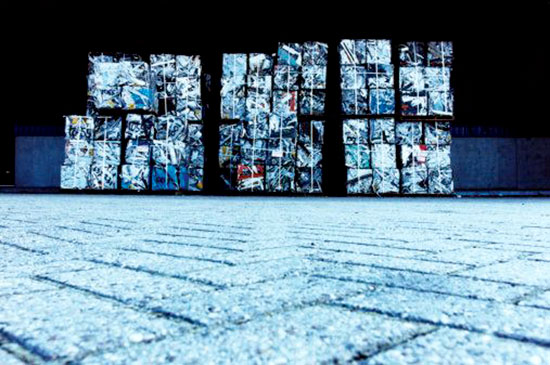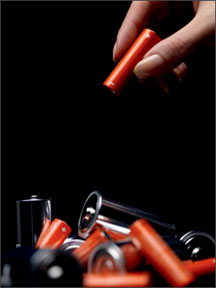Waste to energy
One man’s waste is another man’s resource:
By Sajitha Prematunge
[email protected]
It’s easy to lay the blame on industries when something goes wrong.
It seems hypocritical that, while we require their services, most fail
to stand up for industries when confronted with a dilemma. The offense
most industries are accused of is environment pollution, caused by
industrial waste.
 As counter attack industries the world over are now going ‘green’.
And they are armed with an allegation proof concept - waste to energy.
This is an ingenious and practical concept that, if put into practice,
will be able to generate energy using waste. As counter attack industries the world over are now going ‘green’.
And they are armed with an allegation proof concept - waste to energy.
This is an ingenious and practical concept that, if put into practice,
will be able to generate energy using waste.
“Waste is a useful thing in a useless place.” said Professor Ajith De
Alwis, Lecturer Department of Chemical and Process Engineering,
University of Moratuwa.
“There is enough legal backing in Sri Lanka for waste management. By
sticking to the National Cleaner Production Strategy alone we can
realize a lot of significant goals.” But in spite of laws and
regulations industrial waste always end up side by side with municipal
waste in garbage dumps.
As a lecturer of a Department that has much experience working with
solid waste, medical waste, electronic waste as well as hazardous waste,
Prof. Ajith De Alwis said that recycling is the best method. Policies
for solid and medical waste management are already in place, but will
not be of any use if they are not adhered to.
“As for liquid waste it can be treated before discharge unlike
gaseous waste. Solid waste on the other hand becomes somebody else’s
problem and ends up in some garbage dump.”
Adverse effects
But the adverse effects of dumping as well as burning waste and
landfills is well known. Dumps, apart from the fact that they destroy
the aesthetic value of an area, are perfect breeding grounds for disease
carrying hosts such as mosquitoes and a place where many cancer causing
agents end up.
Specific industries emanate different sorts of waste and among the
most dangerous are chemical waste. “Roughly around one million chemicals
are identified and over 100,000 are currently in commercial use. New
chemicals in high doses can cause genetic mutations.
 The Minamata disease, that was caused by mercury is one such example.
In a sense it’s like we are opening a pandora’s box.” The Minamata disease, that was caused by mercury is one such example.
In a sense it’s like we are opening a pandora’s box.”
Director Department of Industrial Waste Management, Central
Environmental Authority, Dr. Sanjaya Ratnayake said that few of the high
pollution causing industries are chemical industry, food and food
processing industry, textile industry and mineral processing industry.
“Chemicals by chemical industries has to be treated before
discharge.”
Landfills
Former Director, Department of Hazardous Waste Management, Central
Environmental Authority and current Director of Pilisaru, Javilal
Fernando said that the excrete from land fills - leachate - is highly
toxic and causes severe soil pollution as well as ground water
contamination. “Specially if there is a water source nearby.”
Consequently certain measures have to be taken if industrial waste is
to be used in land fills.
Incineration
Direct air pollution can be caused by burning of waste. “Burning of
some types of waste can emanate highly toxic air pollutants like
dioxines and furans. Odour is a minor problem.”
Prof. Ajith De Alwis said that he doesn’t recommend incineration -
another method of getting rid of waste - as a viable solution for Sri
Lanka. “Unless energy recovery is coupled with it, incineration is not
advisable. It’s environmentally tricky.”
Dr. Sanjaya Ratnayaka agreed with this saying that special technical
consultations has to be done when material like plastics are
incinerated, to minimize air pollution. Jayavilal Fernando said that by
incineration, we lose out on 60% of the biodegradable material. More
than 60% of waste in Sri Lanka is biodegradable.
“It can be subject to composting.” pointed out Javilal Fernando. “Non
biodegradables such as plastic, glass and metal if recycled would have a
huge demand as raw materials and can be re-integrated to industry with
no environmental degradation.”
The cost of incineration and technological expertise required is too
much for a developing country like Sri Lanka, which is currently
struggling for various other solutions. “Incineration involves burning
waste at very high temperatures under controlled systems. It requires
highly technical measurements of air quality. Therefore incineration is
not economically feasible for a country like Sri Lanka.”
Waste of valuable material
Apart from the health hazards and environmental degradation, Prof.
Ajith De Alwis pointed out that we are wasting valuable material by
dumping or disposing of waste using other destructive methods. He
pointed out that before dumping, the three ‘R’s concept have to be
adhered to - reduce, reuse and recycle.
“But we have lost sight of a more important ‘R’ - ‘rethink’.” In the
name of justice we often do injustice to the material. One mans waste is
another mans resource. “We often destroy so-called waste that can be of
immense use to another industry whether it is recovered as raw material
or energy.
 Professor Ajith De Alwis pointed out that in countries like Germany
they use confiscated alcohol that is smuggled into the country to
produce biogas as fuel for railway sector. Where as in Sri Lanka
confiscated liquor is poured down the drain.” Professor Ajith De Alwis pointed out that in countries like Germany
they use confiscated alcohol that is smuggled into the country to
produce biogas as fuel for railway sector. Where as in Sri Lanka
confiscated liquor is poured down the drain.”
This is resulted by a lack of linkage between industries, in Sri
Lanka. If all the industries were interlinked one industry’s waste could
easily be turned into another’s resource. “There should be a cascading
of resources. But because of the lack of linkage ones waste just remain
waste.”
Waste to energy
All experts seem to agree on the fact that ‘waste to energy’ is the
most feasible solution for Sri Lanka. It gets rid of waste, which is one
of the major problems of the country as well as individual industries.
“Waste through technological process can be converted to waste, in
which heat is a byproduct.” But Jayavilal Fernando pointed out that this
process requires a considerable amount of waste and that the technology
involved in generating energy using industrial waste is much different
from the technology required for generating energy from municipal waste.
One method of generating energy from waste is co-processing. Compared to
other more conventional and less desirable waste disposal mechanisms
co-processing causes no environmental degradation what so ever.
Because of the extreme temperatures involved there are no other
harmful byproducts, such as toxic gasses. It involves incorporating the
energy potential and mineral components of waste into the manufacture of
another product. This technology is currently in use the world over in
cement factories.
There is no point in blaming the industries for environmental issues,
points out Prof. Ajith De Alwis. “By doing so we have already managed to
kill a few industries.” While industries should also make an effort to
be eco-friendly, Sri Lankan technology should enhance to minimize
environmental degradation caused by industries. The better industries
perform the better it is for the Sri Lankan economy.
“However industries should move towards learning, and not be entirely
governed by purely commercial aspirations.” |
